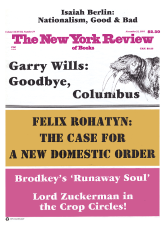AUTHOR’S NOTE: “Instruction” was written in 1986 to commemorate the thirtieth anniversary of the Hungarian uprising. The anniversary coincided with the sixty-ninth anniversary of the October Revolution in Russia, which explains a certain laziness on the part of the border-guards and the secret police. The poem is set at the spot where the uprising began, Budapest’s monument to Josef Bem, Polish general and hero of the Hungarian Revolution of 1848, and it makes reference to the Polish poet Cyprian Norwid’s great poem honoring General Bem (1851). The journey described here, from Vienna to Budapest, was my first return to Eastern Europe after the Soviet Union withdrew my passport in 1977.—T.V.
The flight takes less than an hour. The border-guard
gives you no trouble in passing; without hurry, he glances over the
passport(the only card in the never-ending game)
and waves his hand. Of course, a lot can change
in a year, a month or a minute;
there’s a risk, albeit not great. Red brick slums
from the Mayerling epoch. A holiday. Portraits in the windows.
not seen for a good decade. Banners, slogans.
The best time in these parts; the authorities have moved out of the
city,the archives are locked, the orderly is too lazy
to touch the disc with his finger; most likely, in the prisons,
there are two or three watchmen left, those particularly in love
with their job. On such a day, the pilot,
not shot down, flies over the land where there’s more uranium and steel
than grain; on such a day he lands in the city
to which you certainly won’t return. True, he’s braver.
November, dark boulevards; without fail, behind the arches, someone
is hiding, just as in a dream. All in all, this reminds one of a dream.
A hill in the mist, but there’s no need to climb the hill.
Here, it seems, it is the only one. The flat plains stretch
to the Dnieper, then to the Urals and Gobi. Past the bridge, turn right.
The splendor of the blinded glass, the extinguished lamps,
the art nouveau fences, the old mosques will accompany you. There are
few passers-by.You remain invisible to them. It’s been drizzling for so many days.
A valley, a vast valley, like the bottom of a lagoon.
Stone snails above the doors; octopi and sea-lilies
on the cornices; even the river is gray as a mollusc
that has crawled out of its shell.
It hasn’t ended, and it won’t end. A woman with a peasant’s face
is selling flowers. A carnation will suffice.
Here, already, it’s not far. Usually the monument has guards,
whose duty it is to confiscate the flowers. But today is a holiday.
They, too, have a right to rest. Exactly thirty years ago,
on the square, there was a gathering (of a thousand? two? There would
have been no room, probably, for five),
some with carnations, some probably empty-handed.
What happened afterward has been written in a wealth of books.
To read such books, you had to leave your homeland.
Here and there, perhaps, a split stone can be found,
a pock-marked granite area, the corner of a building, cut off,
but after all these years it’s difficult to grasp without a guide.
You know little, to tell the truth, about the person on the square:
“having crossed his arms on the armor,” “the walls of Jericho
tumble down,””farther—farther—.” Possibly the best verses on earth.
A Freemason, an artillerist. Lame, with a burnt face.
Labiau, Ostroleka, Wola, Timisoara.
There were somewhat more lost battles than won.
He died of fever in the town of Aleppo, soon after embracing Islam.
Not one passer-by. Put the carnation at the feet,
that the world may fall inward like a star, defeated by its own gravity.
The continent collapses into the valley, the valley into the city mist,
the city mist into the square, the square into the monument.
The center of all is the carnation. Heavy, nothing but neutrons.
When you pass by, two hours later,
it will still be lying on the stone. Or, at least, so it will seem.
A meaningless gesture. You waited thirty years for it.
You changed countries, destinies, friends, but attained your end.
The people who then assembled on the square (not all of them returned
home)waited for a century. Even more: a hundred and eight years. What can
one do;
these plains, steppes, mist teach one how to wait.
This Issue
November 21, 1991



